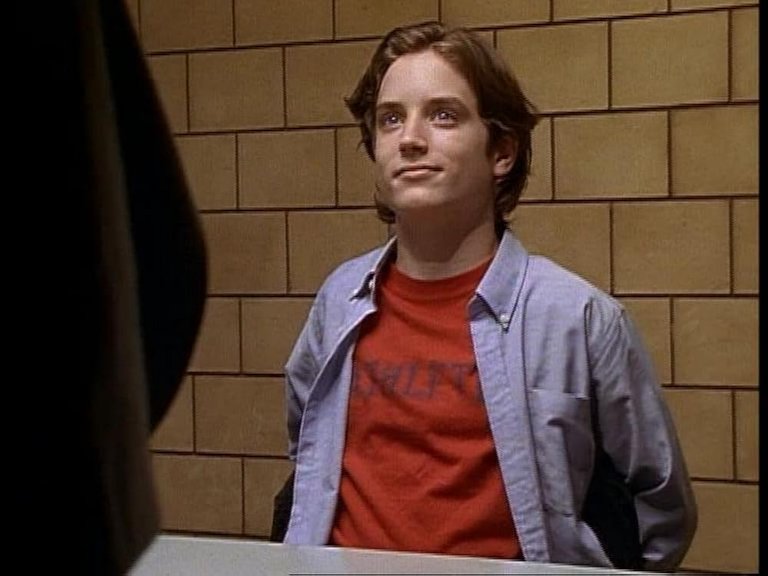Television Review: The True Test (Homicide: Life on the Street, S5X08, 1996)

The True Test (S05E08)
Airdate: 22 November 1996
Written by: Noah Behn
Directed by: Alan Taylor
Running Time: 46 minutes
Homicide: Life on the Street, with its unflinching portrayal of policing in Black majority city of Baltimore inevitably grapples with race as a central theme. Yet the series’ brilliance lies in its refusal to reduce its exploration of violence and injustice to simplistic racial binaries. The True Test, an episode from Season 5, distinguishes itself by shifting focus to another often-overlooked axis of division: social class. While American popular culture frequently romanticises the “American Dream” as a universal ladder of opportunity, this episode dissects the corrosive power of inherited privilege, a theme more familiar to Britain’s rigid class hierarchies than to the myth of self-made success. By situating a murder within the rarefied world of an elite boarding school, The True Test exposes how class can eclipse even race in shaping opportunity—and violence—within America’s social fabric.
The episode’s use of Hubert Parry’s orchestration of “Jerusalem”—the unofficial English anthem, sung by a boys’ choir—frames this exploration of class with deliberate irony. The song’s lyrics, evoking a romanticised vision of England’s past, echo the WASP elite’s delusions of entitlement. This musical motif bookends a narrative that contrasts sharply with the gritty, working-class streets the Homicide Unit typically inhabits. The murder occurs at Larchfield Perp School, a bastion of Southern aristocracy and WASP privilege, where students from wealthy families live in a bubble of inherited status. Marshall Buchanan, the Black victim, is an outlier: a scholarship student and computer prodigy, his presence threatens the school’s carefully curated exclusivity. His murder becomes a catalyst to explore how class resentment and entitlement manifest in a society that claims to value merit.
The investigation, assigned to Detectives Lewis and Bayliss, initially hints at racial tensions. Marshall’s status as one of only three Black students at Larchfield might suggest a hate crime, but the truth reveals a more insidious dynamic. The culprit is McPhee Broadman (Elijah Wood), a 17-year-old heir to wealth and influence, whose manipulative brilliance and sociopathic charm allow him to orchestrate Marshall’s bullying and murder. McPhee’s mother, Judge Susan Aandhal (Sagan Lewis), embodies the intergenerational power of elite networks, using her legal clout to shield her son. McPhee’s manipulation of Derek Delmond (Andrew Bowser), Marshall’s roommate pressured into confessing crime he didn’t do, underscores how privilege shields the powerful from accountability. Bayliss, driven by his own class resentment—his middle-class cousin had background deemed insufficient for Larchfield’s standards—pushes the case despite career risks, setting a clever trap for Broadman in the station’s interview room (“the Box”). His defiance becomes a quiet rebellion against a system that rewards birth over merit.
While the central narrative is compelling, the episode’s subplots feel mechanically attached to prior character arcs, diluting its thematic focus. Detective Kellerman’s struggle against false accusations by corrupt former colleagues, his solace found in conversations with Dr. Cox, and Brodie’s half-hearted attempt to address homelessness as guest on Kelerman-s boat, all feel like routine updates rather than meaningful developments. Similarly, Pembleton’s relief at passing the firearms test, restoring his role in the Homicide Unit, offers a fleeting moment of optimism but lacks the emotional depth that defined earlier episodes. These subplots, though serviceable, serve as reminders of Season 5’s uneven pacing, where the series’ once-sharp storytelling occasionally falters under the weight of extended character threads.
True Test is not among Homicide’s finest episodes—Season 5 as a whole struggles to recapture the urgency of its earlier seasons—but it remains a standout for its nuanced handling of class. The script’s strength lies in Elijah Wood’s performance as McPhee Broadman, a chilling portrayal of youthful arrogance and moral vacuity long before his Lord of the Rings fame. Wood embodies the entitlement of the elite: articulate, charming, and utterly devoid of empathy. His McPhee is no brute but a calculating puppeteer, using others’ insecurities to protect his own status. The episode’s climax, with Bayliss outwitting McPhee in the Box, underscores the tension between individual morality and systemic corruption—a tension that defines Homicide’s worldview.
True Test succeeds as a critique of America’s unspoken class war, using the familiar lens of police procedural to dissect how privilege perpetuates injustice. While its subplot threads feel formulaic and its pacing occasionally sluggish, the episode’s core narrative—rooted in Wood’s electrifying performance and Bayliss’s defiance—resonates as a timely reminder that the American Dream is often a myth upheld by those who need it least. For a series too often overshadowed by its Law & Order progeny, True Test reaffirms Homicide’s enduring relevance in dissecting the complexities of power, race, and class.
RATING: 7/10 (+++)
Blog in Croatian https://draxblog.com
Blog in English https://draxreview.wordpress.com/
InLeo blog https://inleo.io/@drax.leo
Hiveonboard: https://hiveonboard.com?ref=drax
Rising Star game: https://www.risingstargame.com?referrer=drax
1Inch: https://1inch.exchange/#/r/0x83823d8CCB74F828148258BB4457642124b1328e
BTC donations: 1EWxiMiP6iiG9rger3NuUSd6HByaxQWafG
ETH donations: 0xB305F144323b99e6f8b1d66f5D7DE78B498C32A7
BCH donations: qpvxw0jax79lhmvlgcldkzpqanf03r9cjv8y6gtmk9